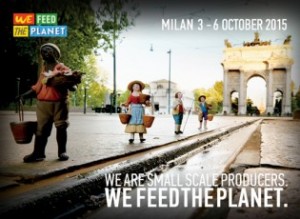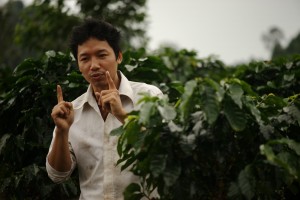This year, the World Expo is in Milan. For the past five months Milan has been the heart of the global food system – the theme for 2015 is ‘Feeding the planet: energy for life’. The stated ambitions of the Expo as ‘a platform for the exchange of ideas and shared solutions on the theme of food’ and to ‘offer a concrete answer to a vital need: being able to guarantee healthy, safe, and sufficient food for everyone’, look a little different once you realise who the key players are.
Coca-cola and MacDonalds both have a big presence at the Expo – neither known for the nutritional (or ethical) value of their products. Even more frustrating than the transformation of an opportunity for a global discussion on the food system into an arena in which global corporations vie to sell their latest techno-fix (almost certainly guaranteed to be highly damaging for the environment), is the way the Expo totally ignores small-scale farmers and producers. (See also reflections by Charlie Hanks on the Nourish blog about his recent visit to the expo.)
Via Campesina – representing 200 million farmers from all corners of the globe – has denounced the takeover of the World Expo by corporate interests.
Given the theme of ‘Feeding the planet’ it seems absurd to exclude those who actually do so. Small-scale food producers are responsible for 70% of the global food supply.
Step in the international Slow Food Youth Network.
We Feed the Planet is an event bringing together young farmers, food producers and food professionals from all over the world to show who really feeds the planet. This week, over 2000 young people with big ideas for the food system are descending on Milan.
An Academy Programme featuring lectures and in depth discussions, as well as workshop spaces and opportunities to meet and learn from each other, will be accompanied by many public events bringing the messages of We Feed the Planet to the streets of Milan.
Amongst the 2000 participants are Lee Ayu, a tribal coffee producer in Maejantai, Thailand (see photo below); Tiginesh Mitik Beyene, an urban agriculturalist from Ethiopa; and Francisco Melo Mederios, an organic grower and bee-keeper in Brazil.
 Small-scale producers tend to have a different approach to Feeding the Planet, because farming is so much more than producing commodities and calories. Over the coming week we will be talking about how to protect seeds, animals, water, soil and other non-renewable sources of nutrition, but also getting excited about growing and eating.
Small-scale producers tend to have a different approach to Feeding the Planet, because farming is so much more than producing commodities and calories. Over the coming week we will be talking about how to protect seeds, animals, water, soil and other non-renewable sources of nutrition, but also getting excited about growing and eating.
The organisers of We Feed the Planet: ‘The work of small-scale producers is about nourishing, but also the joy of living: the happiness that comes from good and beautiful things, from sharing, and from the wisdom that preserves the Earth in order to leave it in a better shape for future generations’.
Olga Bloemen and Bella Crowe from Nourish Scotland are extremely excited to be at We Feed the Planet, and they will be blogging from the event all week. Follow them also on Twitter.